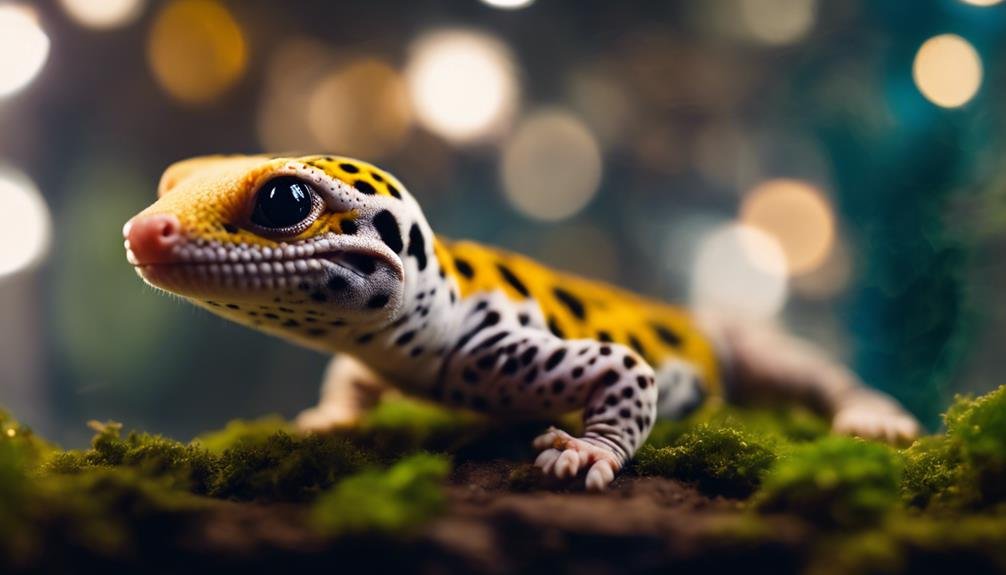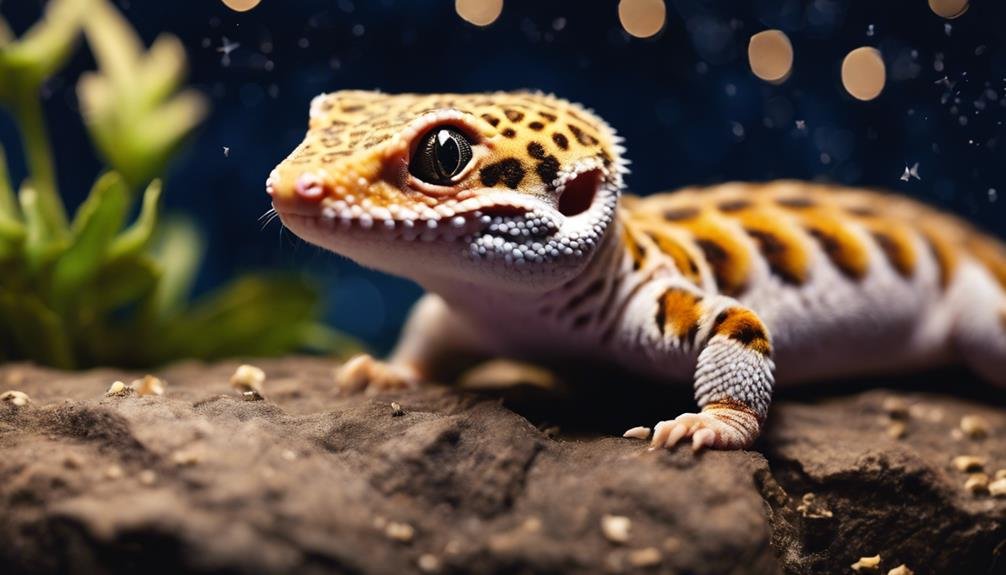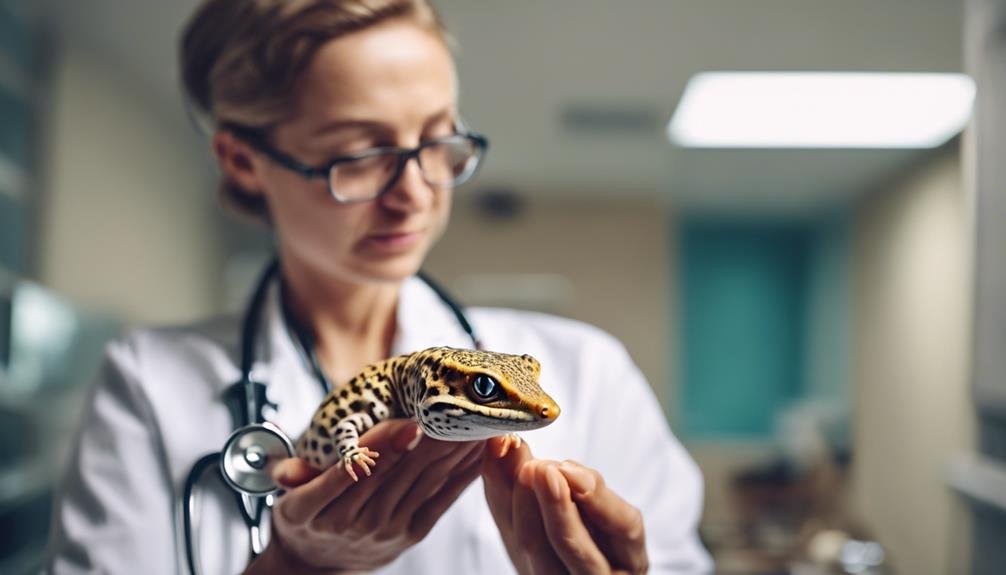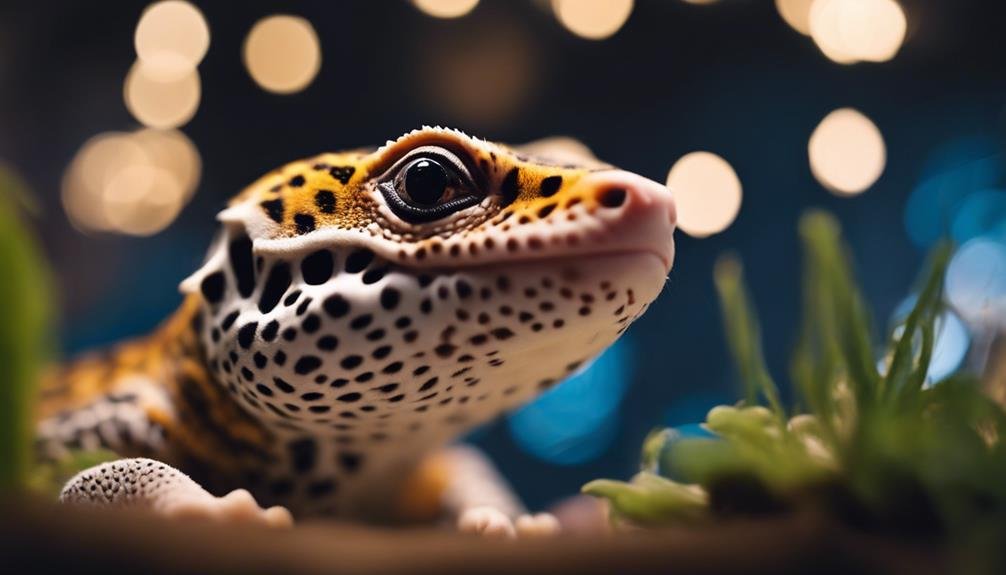When your leopard gecko starts gazing upwards persistently, it’s not just admiring the sky; it could be signaling something far more serious. Known as stargazing, this behavior often points to potential health issues, from genetic disorders like Enigma syndrome to neurological complications or environmental stress. You’ll need to distinguish between its harmless curiosity and a symptom that warrants immediate attention. By grasping the underlying causes and taking the right precautions, you can guarantee your pet’s well-being. Let’s explore how you can identify concerning behaviors and the steps you should take to address them, keeping your reptilian companion healthy and happy.
Key Takeaways
- Stargazing in leopard geckos often indicates neurological issues or stress, requiring immediate attention.
- Environmental factors like improper tank size or temperature can trigger stargazing behavior.
- A balanced diet rich in calcium and vitamin D3 is crucial to prevent nutrition-related stargazing.
- Providing environmental enrichment and minimizing stressors can significantly reduce stargazing incidents.
- Consult a veterinarian for persistent stargazing to rule out underlying health problems and receive tailored care.
Understanding Stargazing Behavior
Understanding stargazing behavior in leopard geckos involves recognizing when they’re fixated on the sky or lights, which might indicate underlying health issues. This peculiar activity can signal something more serious, such as Enigma syndrome, a genetic disorder that disrupts their vestibular system. It’s vital to observe if your pet frequently exhibits this behavior, as it doesn’t solely occur in geckos with Enigma syndrome. Leopard geckos without this genetic condition can also display stargazing due to various environmental factors.
When you notice your leopard gecko staring upwards persistently, it’s important to monitor their environment. Adjusting factors like tank size, temperature, and lighting might help mitigate this behavior. However, if stargazing continues, seeking advice becomes critical for your gecko’s health.
A forum community dedicated to leopard gecko enthusiasts can be invaluable in these situations. Such platforms offer a wealth of knowledge and experience from other gecko owners who’ve faced similar issues. Sharing your concerns and learning from others who’ve navigated the challenges of Enigma syndrome or environmental-induced stargazing can provide both reassurance and practical solutions to guarantee your gecko’s well-being.
Common Causes of Stargazing
Having explored the behavior of stargazing in leopard geckos, let’s examine the common causes behind this concerning activity. Stargazing isn’t just a unique posture; it’s a sign that warrants your attention and care. While it may look peculiar or even cute at first glance, it’s important to understand what your pet might be trying to communicate through their stargazing behavior. Here are some common triggers:
- Genetic Disorders: Enigma syndrome directly affects the vestibular system, making stargazing more prevalent in enigma leopard geckos.
- Environmental Stress: Inadequate tank size and improper temperatures can disrupt your gecko’s comfort and health, leading to stress-induced stargazing.
- Neurological Issues: This behavior often points to underlying neurological problems that require prompt attention.
- Stress: Beyond the physical environment, stress from handling or tank mates can trigger this behavior.
- Care Needs: Ignoring the specific care needs, like habitat setup and temperature regulation, can exacerbate stargazing.
Addressing stargazing in leopard geckos involves more than just observing. It’s about taking action—seeking veterinary advice and adjusting their environment—to guarantee their health and happiness.
Identifying Normal Vs. Concerning Behaviors


To protect your leopard gecko’s health, it’s important to distinguish between their normal staring and the concerning behavior of stargazing. When your leopard gecko stares, it’s often simply observing its surroundings or eyeing potential prey. This is a natural and healthy behavior. However, star gazing, characterized by prolonged upward gazing or circling, can be a sign of neurological issues, such as enigma syndrome, especially in enigma leopard geckos.
Understanding the difference between occasional, curious staring and persistent star gazing is vital. If you notice your gecko frequently engaging in star gazing, it’s time to seek advice and closely monitor their environment for any stressors or health concerns.
Here’s a quick guide to help you visualize the differences:
| Normal Behavior | Concerning Behavior |
|---|---|
| Observing surroundings | Prolonged gazing at the sky |
| Eyeing potential prey | Circling without purpose |
| Occasional staring | Persistent star gazing |
| Shows interest in movement | Lack of focus, disoriented |
Identifying these behaviors early and understanding their implications can have a significant impact on your leopard gecko’s well-being and longevity.
Diet and Stargazing Connections
Your leopard gecko’s diet plays a pivotal role in preventing stargazing behavior, with deficiencies in calcium and vitamin D3 often being culprits. It’s essential to understand that inadequate nutrition not only affects their physical health but can lead to serious neurological issues, such as stargazing. Ensuring that your leopard gecko receives a balanced diet rich in essential nutrients is key to their overall well-being and can greatly reduce the occurrence of diet-related stargazing.
To evoke emotion and highlight the importance of a proper diet, consider these points:
- Watching your leopard gecko helplessly exhibit stargazing can be heart-wrenching.
- The thought of your pet suffering from preventable dietary deficiencies is deeply unsettling.
- Realizing the power you hold in preventing such conditions with proper nutrition is empowering.
- The relief in seeing your leopard gecko thrive, free from the grips of stargazing, is immeasurable.
- The bond strengthened by your commitment to their health and happiness is invaluable.
Environmental Enrichment Tips


While a balanced diet is foundational for preventing stargazing in leopard geckos, enhancing their environment further supports their well-being. As a gecko owner, you play an important role in providing an enriched habitat that stimulates your pet’s natural behaviors and curiosity. Introducing a variety of hides and climbing structures not only encourages exploration but also offers essential hiding spots for stress relief. Consider diversifying the substrates in their enclosure with options like eco earth, paper towels, or reptile carpet to add texture and interest to their living space.
Incorporating live or artificial foliage can mimic their natural habitat, creating a more engaging and comfortable environment for your gecko. Adding safe, non-toxic decorations such as cork bark or smooth rocks presents new exploration and climbing opportunities, which are essential for their physical and mental health. Remember, rotating and changing these environmental enrichment elements regularly can help prevent boredom and keep your gecko mentally stimulated. By focusing on these enrichment tips, you’re not just decorating their space; you’re enhancing their quality of life and wellbeing.
Stress-Related Stargazing
You’ve learned how enriching your leopard gecko’s environment can prevent many issues, but now let’s tackle stress-related stargazing.
Recognizing the signs of stress is vital, as changes in their habitat can lead to this concerning behavior. By minimizing these stressors, you’re taking a proactive step in ensuring your gecko’s well-being and preventing stress-induced stargazing.
Identifying Stress Signs
Identifying stress signs in leopard geckos, such as stargazing, often involves looking for changes in their behavior, like frequent hiding or erratic movements. If you’re part of the leopard gecko community, you know how important it’s to make sure your scaly friend feels safe and stress-free. Look out for:
- Sudden changes in their environment causing distress
- Frequent hiding more than usual, avoiding interaction
- Reduced appetite, showing less interest in food
- Erratic movements, unusual or hyperactive behavior
- Loud noises or aggressive tank mates creating a hostile environment
Addressing these signs promptly can help alleviate stress, enhancing the wellbeing of your leopard gecko. It’s about creating a sanctuary, not just a tank, for them to thrive in.
Minimizing Stress Causes
Understanding the signs of stress in leopard geckos, such as stargazing, now leads us to explore how to minimize these stressors effectively. Providing a secure and comfortable enclosure is key. Make sure you’ve got a proper temperature gradient across the tank and plenty of hiding spots. These elements are vital to reduce stress-induced behaviors like stargazing. Additionally, limiting disturbances, loud noises, and handling can greatly decrease stress levels in your gecko.
| Factor | Action | Benefit |
|---|---|---|
| Environmental Control | Monitor temperature gradient | Ensures comfort |
| Shelter | Increase hiding spots | Offers security |
| Routine | Consistent feeding schedule | Reduces anxiety |
When to Consult a Veterinarian


If your leopard gecko’s stargazing behavior becomes persistent or worsens, it’s crucial to consult a veterinarian promptly. This unusual activity could signal something more serious than quirky behavior, possibly indicating Enigma syndrome or another underlying health issue. Veterinarians can investigate the root cause, providing peace of mind or timely intervention. Seeking their advice isn’t just about addressing the immediate oddity but ensuring your beloved pet’s overall well-being.
- Peace of Mind: Knowing you’ve taken steps to understand and address your gecko’s condition can bring immense relief.
- Expert Care: A vet’s expertise can uncover issues invisible to the untrained eye, ensuring your gecko receives the best possible care.
- Preventive Measures: Early detection can prevent complications, safeguarding your gecko’s health.
- Tailored Guidance: Receive advice and treatment options that cater specifically to your gecko’s needs, enhancing their quality of life.
- Emotional Support: The process can be emotionally taxing, but a veterinarian’s support guides you through making informed decisions for your pet’s care.
Handling and Interaction Guidelines
After consulting a veterinarian to confirm your leopard gecko’s health, it’s equally important to know how to handle and interact with them properly. Gently supporting their body can guarantee a positive experience for both of you, preventing stress. Here’s a straightforward guide to help you establish a stress-free environment for your Leopard Gecko.
| Do’s | Don’ts |
|---|---|
| Handle your leopard gecko gently to prevent stress. | Avoid sudden movements that can startle your gecko. |
| Allow your gecko to approach your hand voluntarily. | Don’t force interaction; Leos always offered the choice. |
| Limit handling sessions to avoid discomfort. | Don’t handle them excessively, respecting their space. |
| Supervise children to ensure gentle handling. | Avoid loud noises during interactions. |
| Observe your gecko’s body language for comfort. | Don’t ignore signs of stress or discomfort. |
Monitoring Health and Signs of Illness
To safeguard your leopard gecko’s health, it’s vital to monitor them for signs of illness such as lethargy, loss of appetite, and unusual behaviors like stargazing. Observing these symptoms early can make a significant difference in their well-being and recovery process. If you notice persistent stargazing or other worrying signs, consulting a reptile veterinarian is important to address any underlying health issues effectively.
When you’re closely monitoring your leopard gecko, look out for:
- Unexplained weight loss, which might signal a deeper health concern.
- Physical symptoms like head tilting, circling, or seizures that are out of the ordinary.
- Changes in behavior or mood, such as increased aggression or unusual lethargy.
- Decrease in regular eating habits, pointing towards possible internal issues.
- Persistent stargazing behavior, as it could indicate neurological problems requiring immediate attention.
Keeping detailed records of your gecko’s behavior, eating habits, and any changes in health will aid in diagnosing and treating any conditions. Don’t hesitate to consult a reptile veterinarian if you’re concerned about your gecko’s health. Early intervention is key to ensuring the well-being of your cherished pet.
Preventive Care Strategies
To keep your leopard gecko healthy and prevent stargazing, it’s important to focus on creating an ideal habitat and conducting regular health checks.
Ensuring their environment mimics natural conditions with the right temperature, humidity, and hiding spots can greatly reduce stress and health issues.
Additionally, routine vet visits and monitoring for any signs of illness will help catch and address potential problems early on.
Optimal Habitat Conditions
Ensuring your leopard gecko thrives involves creating ideal habitat conditions that mimic their natural environment. The key to preventing issues like stargazing starts with understanding and providing the essentials for their well-being.
- Tank Size: Start with a 10-gallon tank for juveniles and upgrade to a 20-gallon for adults, giving them ample space to explore.
- Temperature Gradient: Maintain a warm side at 88-90°F and a cool side at 70-75°F to simulate their natural habitat.
- Humidity & Moist Hide: Keep humidity levels at 20-40% and provide a moist hide to facilitate shedding.
- UVB Lighting: Use a UVB bulb with a 5-7% output to prevent metabolic bone disease.
- Varied Diet: Offer gut-loaded insects supplemented with calcium and multivitamins to support their health.
Regular Health Checks
Regularly monitoring your leopard gecko’s health can catch potential issues early, keeping them in peak condition. In a community dedicated to reptile care, making sure your leopard gecko keeps thriving involves more than just love; it requires attention to detail in their health checks.
| Aspect | What to Check | Why It’s Important |
|---|---|---|
| Skin & Body | Shedding, parasites, deformities | Prevents infections, promotes proper growth |
| Activity & Behavior | Appetite, hydration, overall activity | Indicates health status, early signs of illness |
| Physical Examination | Weight, eyes, feet, tail, spine | Identifies potential injuries or abnormalities |
If anything seems off during these checks, don’t hesitate to seek veterinary advice. Staying vigilant is key to addressing health concerns before they become serious, ensuring your leopard gecko remains a happy, active member of your family.
What Precautions Should I Take if My Leopard Gecko is Showing Signs of Enigma Syndrome or Seizures?
If your leopard gecko is showing signs of enigma syndrome or seizures, it’s important to take immediate precautions. Provide a stress-free environment, ensure proper temperature and humidity levels, and consult a vet specializing in leopard geckos. Always monitor for any changes in behavior and seek professional help if necessary.
Frequently Asked Questions
What Is Stargazing Syndrome in Leopard Geckos?
Stargazing syndrome in leopard geckos is when they consistently look up, seemingly at the sky. It’s often tied to genetic predispositions, like Enigma syndrome, affecting their balance and orientation.
Environmental factors, including tank size and temperature, can also play a role. If you notice your gecko stargazing, it’s important to monitor their behavior closely and consult a vet, as it could signal underlying health issues needing attention.
What Does It Mean When a Leopard Gecko Looks Up?
When your leopard gecko looks up, it’s not just showing off its behavioral quirks; it could be stargazing. This might signal something’s amiss, often linked to enigma syndrome or influenced by environmental factors like lighting or enclosure setup.
Don’t brush it off as cute—this behavior warrants attention. You should monitor it closely and consider seeking guidance to make sure your scaly friend’s well-being isn’t at risk.
How Do I Know if My Leopard Gecko Is Unhealthy?
To tell if your leopard gecko is unhealthy, watch for signs like appetite loss or issues with skin shedding. If they’re lethargic, weak, or have trouble moving, it could indicate Metabolic Bone Disease.
Seizures, rolling over, or respiratory infections are serious symptoms needing a vet’s care. Also, tail problems or not eating can signal health concerns. If you notice these red flags, it’s important to seek veterinary advice immediately.
What Does It Mean When My Leopard Gecko Is Glass Surfing?
When your leopard gecko is glass surfing, it’s indicating discomfort or a desire for more space. It’s important you inspect your terrarium setup.
Make sure it’s spacious and offers environmental enrichment like hiding spots and temperature gradients. This behavior often points to stress or boredom, so by enriching their environment and addressing any setup issues, you’ll help them feel more at ease and potentially stop the glass surfing behavior.
Conclusion
In wrapping up, if you notice your leopard gecko stargazing, it’s important to distinguish between curiosity and a health concern. Make sure they’re getting a balanced diet and plenty of environmental enrichment.
If the behavior persists, don’t hesitate to consult a vet. Regular handling and monitoring for signs of illness are vital.
By taking these preventive steps, you’ll help ensure your gecko’s well-being and nip any potential health issues in the bud. Remember, early action is always best.


